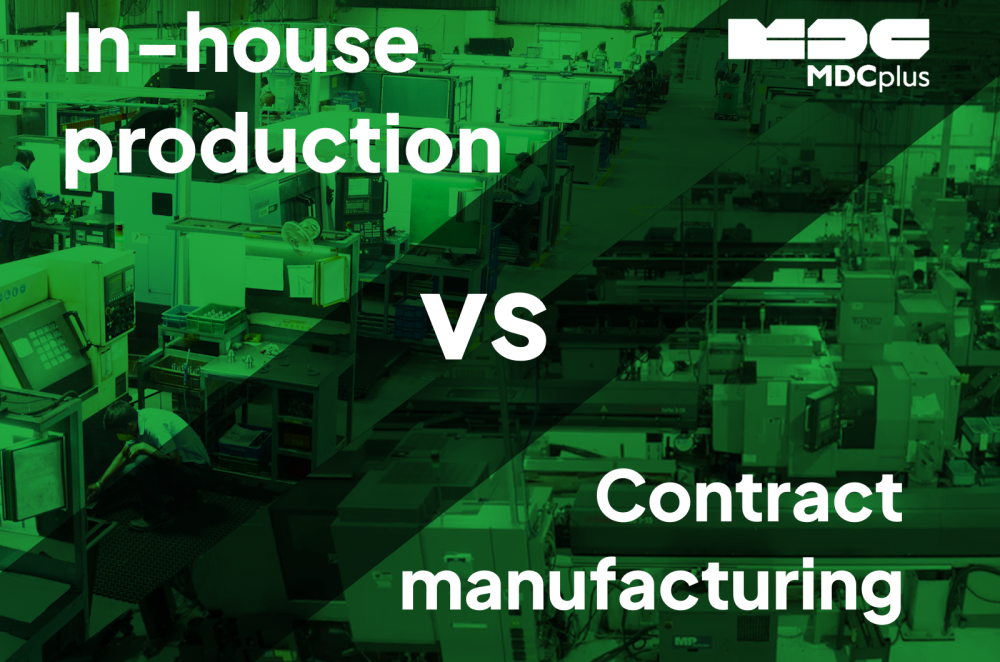More power to in-house manufacturing
Get started with your projectIn-House Production vs. Contract Manufacturing: Deciding on Your Production Strategy
Businesses often find themselves at a crossroads: should you invest in your own production facility, or is it wiser to continue working with contract manufacturers? Each option has its own set of advantages and challenges, and the right choice depends on factors like production volume, product complexity, intellectual property protection, and long-term business plans.
When to Build Your Own Production Facility
Building your own facility is a big investment—but it can be worthwhile if your situation calls for it. Consider this route when:
-
High Production Volumes:
If your demand is steady or growing, producing in-house can reduce the cost per unit over time. The upfront expense makes more sense when spread over many units. -
Enhanced Quality Control:
Producing on your own premises allows you to monitor every step closely. You can spot issues immediately and make quick improvements, ensuring that every unit meets your standards. -
Real-Time Production Visibility:
Running your own facility gives you a clear, day-to-day view of how your product is made—from raw material sourcing to final assembly. This level of transparency helps you catch inefficiencies and maintain a tighter grip on quality, something that’s often harder to achieve with an external supplier. -
Protection of Intellectual Property:
For products with sensitive designs or unique technology, keeping production in-house reduces the risk of leaks or imitation. It’s a safer way to keep your innovations under wraps. -
Flexibility for Customization:
If you need to make frequent design tweaks or iterate quickly based on customer feedback, an in-house team lets you adapt without delays. Changes can be implemented immediately, keeping your product fresh and competitive. -
Long-Term Strategic Investment:
When manufacturing is a core part of your competitive edge, owning your production process can lead to better margins over time. Once you recoup the initial investment, you may find that in-house operations offer improved profitability and greater control.
For example, a technology company creating a specialized electronic device might choose in-house production to safeguard its unique design, ensure top-notch quality, and keep a close watch on every detail of the process.
When to Continue with Contract Manufacturing
On the other hand, outsourcing your production has its own merits—especially when flexibility and lower risk are top priorities. This option works well if:
-
Volumes Are Low or Uncertain:
If you’re still testing the market or catering to a niche segment, the significant cost of building a facility might not be justified. Outsourcing keeps your costs in check while you gauge demand. -
Your Expertise Lies Elsewhere:
If your team excels at design, research, or marketing rather than manufacturing, contract manufacturers bring the specialized skills and established processes that can be hard to duplicate in-house. -
You Prefer Lower Upfront Investment:
Avoiding the heavy capital outlay needed for a facility can be a major advantage, particularly for startups or companies with limited financial resources. -
You Need Operational Agility:
Established contract manufacturers can often ramp production up or down quickly based on market needs. Their existing infrastructure and supply chains allow them to handle sudden demand changes more efficiently. -
Focus on Core Competencies:
By outsourcing production, you free up time and resources to concentrate on what you do best—whether that’s innovating, engaging with customers, or growing your brand.
For instance, a startup launching a new consumer product might start with contract manufacturing to keep risks low and costs flexible while refining its design and understanding market dynamics.
Key Questions to Ask Yourself
To decide which route is best, consider these questions:
Volume & Demand:
Is your production volume high enough to justify the fixed costs of a facility?
Quality & Control:
How important is it for you to have immediate oversight and the ability to make quick adjustments?
Visibility:
Do you need real-time insight into every aspect of your production process? In-house operations give you that clear view, which can be crucial for continuous improvement.
Intellectual Property:
How sensitive is your technology, and can you risk sharing production details with external partners?
Financial Resources:
Do you have the capital to invest in a facility, or would you prefer the flexibility of outsourcing?
Core Strengths:
Is manufacturing a key part of your business, or is it better to focus on other areas like product development and marketing?
Supply Chain Stability:
Would you prefer the security of managing production yourself, or are you comfortable relying on an external supply chain?
Choosing between building your own production facility and sticking with contract manufacturing isn’t a one-size-fits-all decision. In-house production gives you better control, flexibility, and the kind of real-time visibility that lets you fine-tune every step of the process. However, it also requires a substantial investment and the right operational expertise. Contract manufacturing, meanwhile, offers a flexible, lower-risk alternative—ideal for situations where demand is unpredictable or where your strengths lie elsewhere.
Many companies find that a hybrid approach works best - keeping critical components in-house while outsourcing other parts. By considering these factors carefully, you can choose the production strategy that aligns best with your business needs, ensuring smooth operations and long-term growth.
About MDCplus
Our key features are real-time machine monitoring for swift issue resolution, power consumption tracking to promote sustainability, computerized maintenance management to reduce downtime, and vibration diagnostics for predictive maintenance. MDCplus's solutions are tailored for diverse industries, including aerospace, automotive, precision machining, and heavy industry. By delivering actionable insights and fostering seamless integration, we empower manufacturers to boost Overall Equipment Effectiveness (OEE), reduce operational costs, and achieve sustainable growth along with future planning.
Ready to increase your OEE, get clearer vision of your shop floor, and predict sustainably?
Other articles
While both involve structured review and analysis, their objectives, scope, and outcomes differ significantly. This article exploring this topic further.
